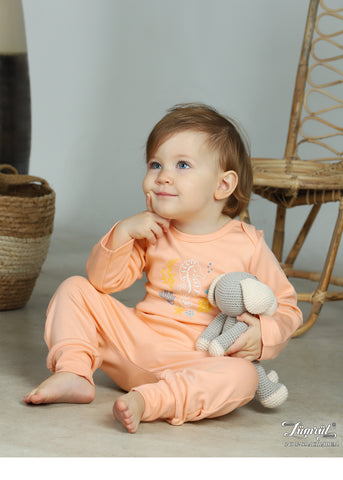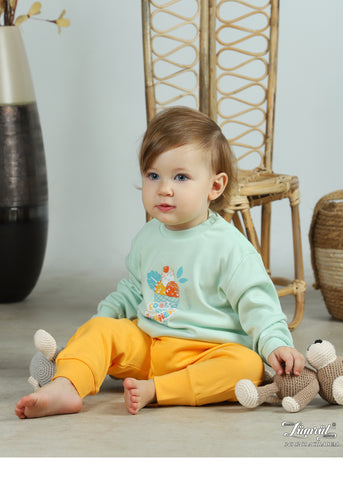Organic baby clothes have gained popularity in recent years, and for good reason. Parents today are increasingly conscious of the choices they make for their little ones, and opting for organic clothing is one of those wise decisions.
Why do we suggest Organic and Sustainable Clothing?
When it comes to dressing your precious little one, it's natural to want the best. Not only should baby clothes be soft and comfortable, but they should also be gentle on your baby's delicate skin and the environment.
Sustainable baby clothes, which combine the goodness of organic cotton and bamboo, offer the perfect blend of comfort and sustainability. In this article, we'll explore what organic baby clothes are, why they are a popular choice among parents, and their numerous benefits.
The Ingredients: Organic Cotton and Bamboo
Organic Cotton:
Organic cotton is a natural choice for your baby's delicate skin. Grown without harmful pesticides and chemicals, it reduces the risk of allergies and skin irritations.
This cotton is grown without the use of synthetic pesticides or genetically modified organisms (GMOs). It is kind to the environment and ensures your baby's clothes are free from harmful chemicals.
Bamboo:
Bamboo is the fastest growing plant in the world. It is a versatile and fast-growing plant that belongs to the grass family Poaceae. It is known for its strength, flexibility, and sustainability.
Bamboo is considered an eco-friendly and sustainable resource. It regenerates quickly, and many bamboo species require minimal water and no pesticides or fertilizers for cultivation. The sustainable growth and harvesting of bamboo contribute to its environmental appeal.
It is naturally hypoallergenic, soft, and breathable, making it an ideal choice for baby clothing. Bamboo products generally have OEKOTEX Certificate which indicates that the bamboo products do not have any harmful chemicals for humans.
What Are The Health Benefits of Organic Baby Clothing?
Chemical-Free:
Organic baby clothes are free from harmful pesticides and chemicals, ensuring that your baby's skin is safe from irritants.
Hypoallergenic:
Both organic cotton and bamboo are hypoallergenic, making them suitable for babies with sensitive skin.
Breathable:
These materials provide excellent breathability, preventing overheating and keeping your baby comfortable.
Sustainable:
Choosing organic materials contributes to sustainable farming practices and reduces the carbon footprint.

The Blend: A Match Made in Heaven
The combination of organic cotton and bamboo in baby clothing offers the best of both worlds:
Super Soft:
The blend creates incredibly soft and gentle fabrics, perfect for a baby's tender skin.Durable:
Organic cotton provides durability, ensuring the clothing withstands the wear and tear of daily use.
Moisture-Wicking:
Bamboo's natural moisture-wicking properties help keep your baby dry and comfortable.
Stylish and Eco-Friendly
Organic baby clothes come in a variety of stylish designs and patterns. By choosing these garments, you not only dress your baby in fashion but also contribute to a more eco-friendly and sustainable future.
Environmental Impact of Organic Baby Clothes
Organic farming practices are significantly more eco-friendly compared to conventional farming methods. They prioritize sustainability, environmental conservation, and responsible land management. Here's how organic farming reduces soil and water pollution and conserves natural resources:
- No Synthetic Chemicals:
Organic farming eliminates the use of synthetic pesticides, herbicides, and chemical fertilizers. This is crucial in preventing soil contamination with harmful chemicals. These synthetic substances can leach into the soil and eventually find their way into groundwater, rivers, and streams, leading to water pollution.
- Composting and Natural Fertilizers:
Organic farming relies on composting and natural fertilizers, such as manure and cover crops, to enrich the soil with essential nutrients. These natural inputs improve soil structure, water retention, and nutrient content, reducing the need for synthetic fertilizers that can contribute to nutrient runoff and water pollution.
- Non-GMO and Heirloom Varieties:
- Natural Pest Management:
Organic farming places a strong emphasis on natural pest control methods, such as introducing beneficial insects, using companion planting, and practicing biological pest control. This reduces the need for synthetic pesticides and their potential negative impact on soil and water.
- Water Conservation:
Organic farming often employs water-efficient irrigation techniques, such as drip irrigation and rainwater harvesting, to minimize water use. Efficient water management helps conserve this precious resource and minimizes the risk of water pollution from agricultural runoff.
- Soil Health Improvement:
Organic farming practices, like composting, cover cropping, and reduced chemical use, promote soil health and fertility. Healthy soils are better at retaining water, reducing the need for excessive irrigation, and preventing runoff that can carry pollutants into water bodies.
- Responsible Land Management:
Quality and Durability
-
Softness and Comfort: Organic clothing, often made from materials like organic cotton or bamboo, is celebrated for its soft and comfortable feel. The fibers are gentle on the skin, making organic clothing ideal for babies, individuals with sensitive skin, or anyone who values comfort.
-
Breathability: Organic fabrics are naturally breathable, allowing air circulation that helps regulate body temperature. This makes organic clothing a comfortable choice, especially in warm or humid conditions.
-
Hypoallergenic: Organic clothing is less likely to cause skin irritations and allergies. The absence of synthetic pesticides and chemicals in organic farming and manufacturing means there are no residual irritants in the fabric.
-
High-Quality Craftsmanship: Many organic clothing brands prioritize quality in their production processes. This includes attention to detail in stitching, design, and finishing, resulting in well-constructed garments.
Durability:
-
Longevity: Organic clothing is often more durable than conventional clothing. The natural materials used, such as organic cotton and bamboo, are known for their strength and longevity. They can withstand frequent washing and maintain their quality over time.
-
Colorfastness: Many organic clothing brands use eco-friendly, non-toxic dyes and processes that promote colorfastness. This means the clothing maintains its vibrant colors and doesn't fade easily, even after numerous washes.
-
Resilience: Organic clothing can be more resilient when it comes to wear and tear. The fabrics are less prone to pilling, fraying, or stretching, ensuring that the clothing maintains its original form and appearance.
-
Eco-Friendly Processing: The manufacturing of organic clothing often involves environmentally friendly practices, which extend to the dyeing and finishing processes. These methods can help maintain the strength and integrity of the fabric.
-
Stitching and Seam Quality: Organic clothing brands pay close attention to stitching and seam quality. Reinforced seams and careful stitching contribute to the overall durability of the clothing.
-
Eco-Friendly Laundry: When cared for properly, organic clothing can last a long time. Using eco-friendly laundry practices, such as cold water washing, gentle detergents, and air-drying, can further enhance the longevity of the clothing.
Bebekish Organic Clothing is designed for durability, able to withstand the test of time, maintain its vibrant colors, and resist wear and tear, ultimately providing a long-lasting and eco-friendly addition to your wardrobe.
Caring for Organic Baby Clothes
1. Washing
-
Use Mild Detergent: Opt for a gentle, eco-friendly, and mild detergent that is free from harsh chemicals and fragrances. This helps preserve the natural properties of the organic materials.
-
Wash Separately: Wash organic baby clothes separately from items with zippers, buttons, or rough fabrics that could cause friction and damage the delicate fibers.
-
Cold Water: Use cold or lukewarm water to wash the clothes. Cold water helps prevent shrinkage and color fading.
-
Delicate Cycle: Use a delicate or gentle cycle on your washing machine to reduce wear and tear on the fabrics.
2. Drying
-
Air Dry: Whenever possible, air-dry organic baby clothes to maintain their softness and prevent shrinkage. Avoid direct sunlight, which can fade colors.
-
Low Heat: If you choose to use a dryer, select the lowest heat setting. High heat can cause damage to the natural fibers.
3. Stain Removal
-
Treat Stains Promptly: Address any stains as soon as they occur. Use a gentle, natural stain remover, or try a mixture of baking soda and water to create a paste to treat the stain before washing.
-
Avoid Bleach: Do not use bleach on organic clothing, as it can weaken the fabric and affect its natural color.
4. Storage
-
Fold, Don't Hang: Folding organic baby clothes is better than hanging them to prevent stretching and damage to the shoulders. Use drawer dividers to keep things organized.
-
Keep Away from Direct Sunlight: Store baby clothes in a cool, dry place away from direct sunlight to prevent color fading and damage.
5. Ironing
- Low Heat: If ironing is necessary, use a low heat setting and place a cloth or towel between the iron and the clothing to avoid direct contact.
6. Avoid Harsh Chemicals
Fabric Softeners: Avoid fabric softeners, as they can leave a residue on the fabric and reduce its absorbency and breathability.
-
Opt for Natural Detergents: Choose natural and fragrance-free detergents, as scented products can contain chemicals that may irritate your baby's skin.
By following these care instructions, you can extend the life of your organic cotton and bamboo baby clothes while maintaining their softness and comfort. Additionally, these practices contribute to a more eco-friendly and sustainable approach to clothing care.
Cost-Effectiveness
Organic clothing is often of higher quality and more durable than conventional clothing. The natural fibers used in organic clothing, such as organic cotton and bamboo, are known for their strength and longevity. This means that organic garments are less likely to wear out or require frequent replacement, saving you money over time.Organic clothing maintains its quality, shape, and color for a longer period, reducing the need to frequently replace worn-out items. This longevity translates into cost savings over the years.
In a world where sustainability and comfort go hand in hand, organic baby clothes stand out as an excellent choice for parents.
The blend of organic cotton and bamboo provides your little one with the softest, most comfortable clothing while minimizing the environmental impact.
Make a conscious choice to dress your baby in garments that are not only safe but also eco-friendly.
At Bebekish, we're dedicated to crafting high-quality organic baby clothes, so your baby can experience the utmost comfort and care while being kind to our planet.












